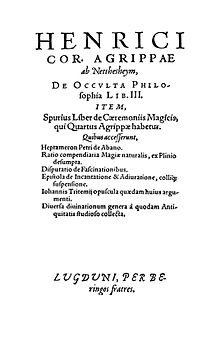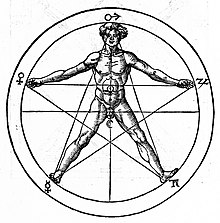
Back De occulta philosophia libri tres Breton Okultna filozofija u tri knjige Croatian De Occulta Philosophia Hungarian De Occulta Philosophia ID La filosofia occulta o La magia Italian De occulta philosophia libri tres Dutch Três Livros de Filosofia Oculta Portuguese Оккультная философия Russian De occulta philosophia Swedish


Three Books of Occult Philosophy (De Occulta Philosophia libri III) is Heinrich Cornelius Agrippa's study of occult philosophy, acknowledged as a significant contribution to the Renaissance philosophical discussion concerning the powers of magic, and its relationship with religion. The first book was printed in 1531 in Paris, Cologne, and Antwerp, while the full three volumes first appeared in Cologne in 1533.[1]
The three books deal with elemental, celestial and intellectual magic. The books outline the four elements, astrology, Kabbalah, numerology, angels, names of God, the virtues and relationships with each other as well as methods of utilizing these relationships and laws in medicine, scrying, alchemy, ceremonial magic, origins of what are from the Hebrew, Greek and Chaldean context.
These arguments were common amongst other hermetic philosophers at the time and before. In fact, Agrippa's interpretation of magic is similar to the authors Marsilio Ficino, Pico della Mirandola and Johann Reuchlin's synthesis of magic and religion, and emphasize an exploration of nature.
- ^ Van Der Poel, Marc (1997). Cornelius Agrippa: The Humanist Theologian and His Declamations. Brill. p. 44.